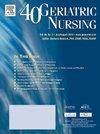Multi-dimensional factors associated with adequate social participation among stroke survivors based on the social ecological model: A cross-sectional study on the gender and living place differences
IF 2.5
3区 医学
Q3 GERIATRICS & GERONTOLOGY
引用次数: 0
Abstract
This cross-sectional study aimed to investigate the multi-dimensional factors associated with adequate social participation among stroke survivors based on the social ecological model, and to identify the gender and living place differences. A total of 470 stroke survivors were recruited through convenience sampling method in two northern tertiary hospitals in China. Stepwise multiple logistic regression models showed that multi-dimensional factors (except for political factors) accounted for 10.10 % of the variance in adequate social participation. Intrapersonal (i.e., anxiety, motivation) and physical environmental factors (i.e., healthcare service accessibility) were strong associated determinants. Health condition (i.e., stroke sequelae) was one of significant determinants of perceiving adequacy in participation only for females. Interpersonal (i.e., social support) and organizational factors (i.e., frequency of community activities) were significant predictors of participation only for males and people living in rural. Comprehensive interventions addressing negative emotions, improving social support and integrating community resources are necessary for full social participation among stroke survivors.
基于社会生态模型的中风幸存者充分参与社会活动的多维因素:关于性别和居住地差异的横断面研究。
本横断面研究旨在基于社会生态模型,探讨脑卒中幸存者充分参与社会生活的多维度相关因素,并识别性别和居住地的差异。研究通过方便抽样的方法在中国北方两家三甲医院共招募了 470 名脑卒中幸存者。逐步多元逻辑回归模型显示,多维因素(政治因素除外)占充分社会参与变异的 10.10%。个人内部因素(即焦虑、动机)和物理环境因素(即医疗服务的可及性)是强有力的相关决定因素。只有女性的健康状况(即中风后遗症)是影响其是否充分参与的重要决定因素之一。人际因素(即社会支持)和组织因素(即社区活动的频率)仅对男性和农村居民的参与度有显著的预测作用。针对中风幸存者的负面情绪、改善社会支持和整合社区资源的综合干预措施对于他们充分参与社会活动是必要的。
本文章由计算机程序翻译,如有差异,请以英文原文为准。
求助全文
约1分钟内获得全文
求助全文
来源期刊

Geriatric Nursing
医学-护理
CiteScore
3.80
自引率
7.40%
发文量
257
审稿时长
>12 weeks
期刊介绍:
Geriatric Nursing is a comprehensive source for clinical information and management advice relating to the care of older adults. The journal''s peer-reviewed articles report the latest developments in the management of acute and chronic disorders and provide practical advice on care of older adults across the long term continuum. Geriatric Nursing addresses current issues related to drugs, advance directives, staff development and management, legal issues, client and caregiver education, infection control, and other topics. The journal is written specifically for nurses and nurse practitioners who work with older adults in any care setting.
 求助内容:
求助内容: 应助结果提醒方式:
应助结果提醒方式:


